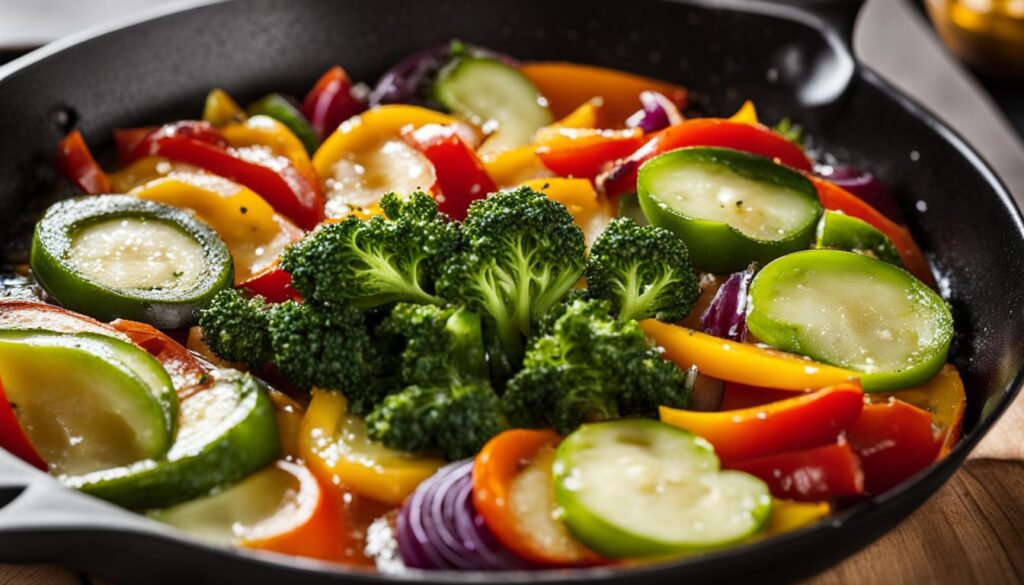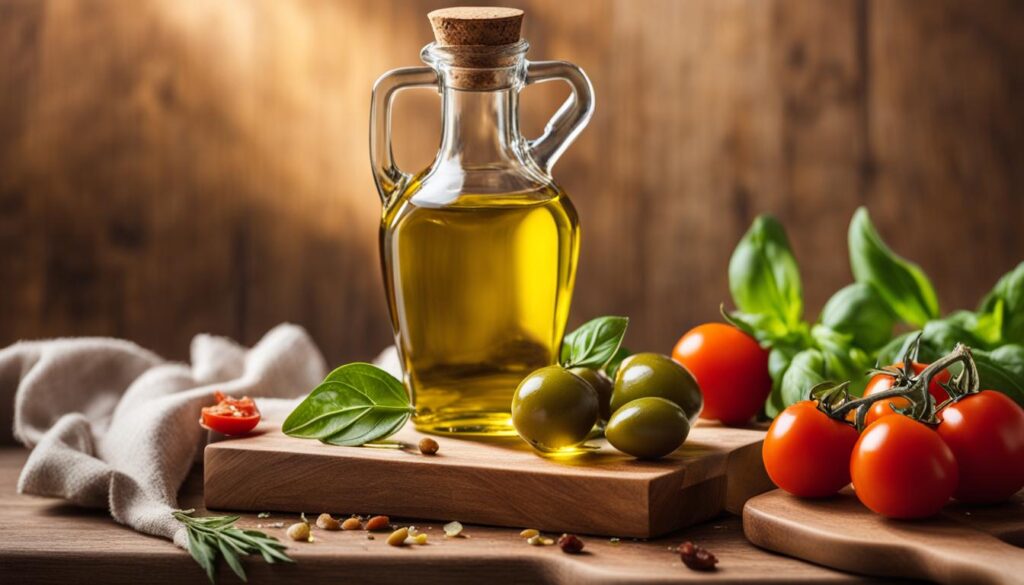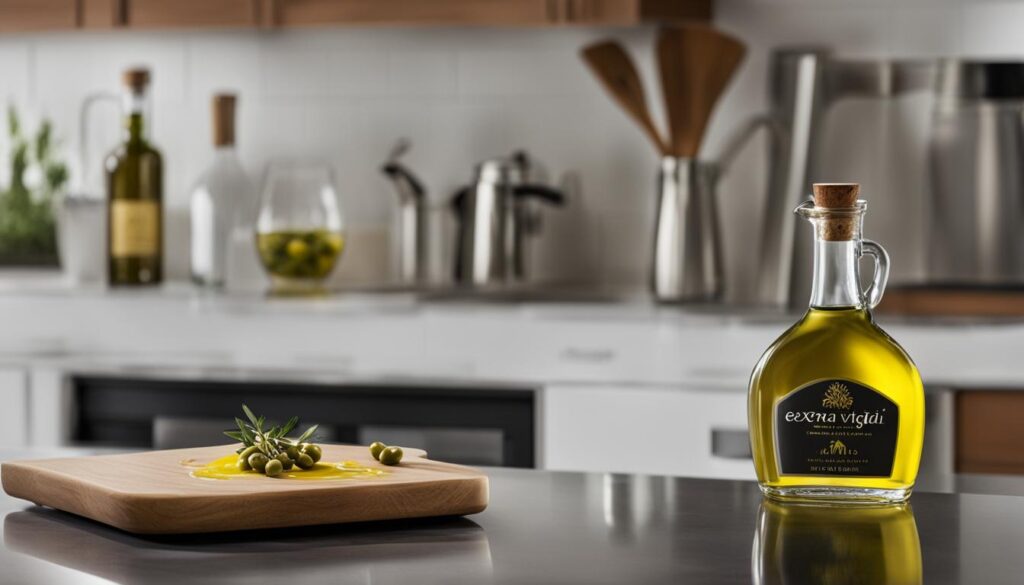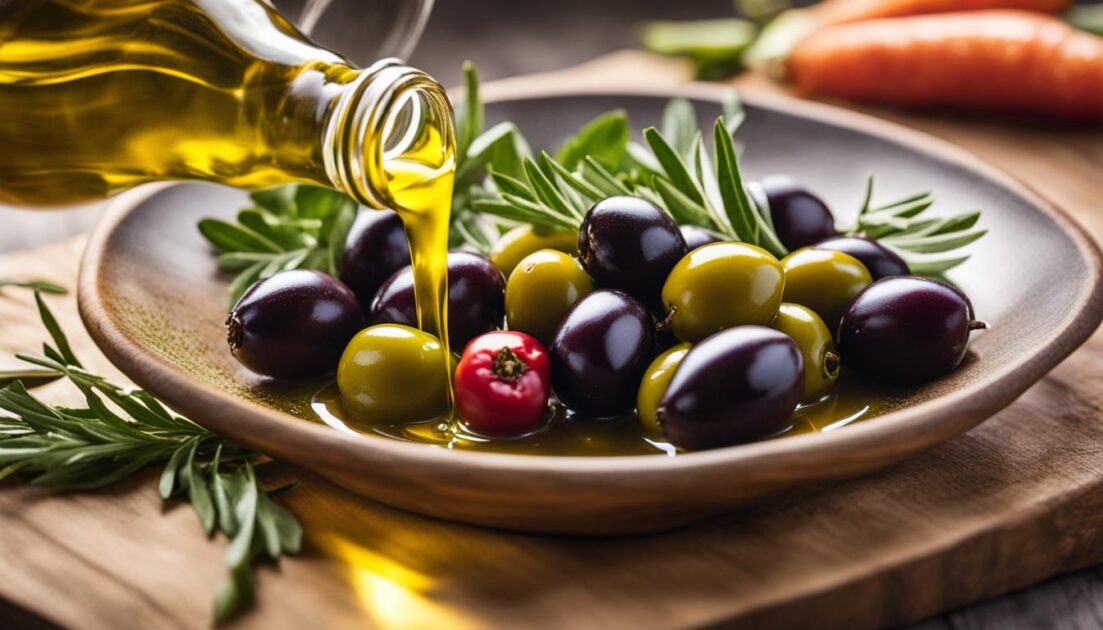When it comes to promoting overall health and well-being, few natural ingredients can compare to the benefits of olive oil. Originating from the Mediterranean region, olive oil has been cherished for its remarkable properties for thousands of years. With its versatile uses in cooking, skincare, and more, this golden elixir is truly a gift from nature.
So, what makes olive oil so special? Let me dive into the numerous health benefits that olive oil offers.
Olive oil is not just a flavorful addition to culinary creations; it has also been associated with numerous health benefits. Studies have shown that incorporating a daily tablespoon of olive oil into your diet can reduce the risk of early death by 19%. This remarkable elixir is known for its ability to lower the risk of cardiovascular diseases, cancer, neurodegenerative disorders, and respiratory ailments.
Key Takeaways:
- Olive oil offers a myriad of health benefits, promoting longevity and protecting against various diseases.
- Regular consumption of olive oil can lower the risk of cardiovascular diseases, cancer, and neurodegenerative disorders.
- Include olive oil in your daily regimen to enjoy its remarkable health rewards.
- Integrating olive oil into your cooking, skincare, and haircare routines can unlock its diverse benefits.
- Look for extra virgin olive oil to ensure the highest quality and maximum nutritional value.
Olive Oil for Cooking: A Healthy Choice in the Kitchen

Olive oil is a versatile and healthy choice for cooking, making it a staple in kitchens around the world. Its unique composition and rich flavor make it a go-to ingredient for a variety of culinary creations.
The Health Benefits of Olive Oil
When it comes to promoting good health, olive oil shines. It is packed with monounsaturated fats, which have been shown to have numerous health benefits. These healthy fats can help reduce the risk of heart disease by lowering cholesterol levels and improving blood vessel function.
In addition, olive oil is rich in antioxidants and anti-inflammatory compounds, such as polyphenols, which can help protect against chronic diseases like cancer and diabetes. These antioxidants also contribute to the oil’s long shelf life, making it a pantry staple that can be enjoyed for an extended period.
| Health Benefits of Olive Oil | Uses |
|---|---|
| Reduces the risk of heart disease | Sautéing |
| Protects against chronic diseases | Baking |
| Supports weight management | Roasting |
| Enhances brain health | Frying |
| Promotes healthy skin and hair | Salad dressings |
How to Use Olive Oil in Your Cooking
Olive oil’s versatility knows no bounds. Whether you’re sautéing vegetables, baking a tasty dessert, or roasting a succulent chicken, olive oil can be your trusty companion in the kitchen.
- Sautéing: Olive oil adds depth and flavor to sautéed vegetables, meats, and seafood. Its high smoke point means you can cook at higher temperatures without worrying about the oil breaking down and becoming unhealthy.
- Baking: Replace butter or vegetable oil with olive oil in your baked goods to add moisture and a unique flavor profile. Olive oil works wonders in cakes, cookies, and even bread.
- Roasting: Drizzle olive oil over your favorite vegetables and roast them in the oven for a delicious and healthy side dish. The oil helps to caramelize the vegetables, bringing out their natural sweetness.
- Frying: Olive oil’s high smoke point makes it perfect for frying foods. Use it to fry up crispy chicken, golden French fries, or even tempura vegetables for a healthier twist on your favorite fried dishes.
- Salad dressings: Create flavorful dressings by whisking olive oil with vinegar or citrus juice and adding your favorite herbs and spices. The oil’s natural richness enhances the flavors of your greens and vegetables.
With these versatile uses and health benefits, it’s no wonder that olive oil is a staple in Mediterranean cuisine and beyond.
Featured Quote
“Olive oil is a gift from nature that elevates our cooking and nourishes our bodies. Its health benefits and culinary versatility make it an essential part of any kitchen.” – Chef Emily Smith
With its numerous health benefits and array of uses, olive oil is a must-have in every kitchen. Incorporate this liquid gold into your cooking repertoire and enjoy the flavorful and nutritious dishes it can produce.
Olive Oil for Skin: Natural Beauty Enhancer
Olive oil offers numerous benefits for the skin. Its rich content of antioxidants, including vitamin E, helps protect the skin from oxidative stress and premature aging. By moisturizing and nourishing the skin, olive oil leaves it feeling soft, smooth, and glowing. It also has anti-inflammatory properties that can help reduce skin conditions such as acne and eczema.
Not only does olive oil work wonders for the skin, but it can also be a natural remedy for dry scalp and dandruff, promoting healthy hair and scalp. Incorporating olive oil into your skincare routine can enhance your overall beauty and provide a range of benefits for both your skin and hair.
The Benefits of Olive Oil for Skin
Here are some of the key benefits of using olive oil for your skin:
- Provides nourishment and moisture to the skin
- Helps protect the skin from oxidative stress and premature aging
- Reduces inflammation and redness
- Promotes a healthy scalp and helps combat dryness and dandruff
- Leaves the skin feeling soft, smooth, and glowing
How to Use Olive Oil for Your Skin
There are various ways to incorporate olive oil into your skincare routine:
- As a moisturizer: Apply a small amount of olive oil to clean, dry skin and gently massage it in. Leave it on overnight for added hydration.
- As a makeup remover: Olive oil can effectively remove makeup, including waterproof products. Simply apply a small amount to a cotton pad and gently wipe away the makeup.
- As a hair treatment: To promote a healthy scalp and combat dryness and dandruff, massage olive oil into your scalp and leave it on for 30 minutes before shampooing.
Remember to choose extra virgin olive oil for the best results, as it retains the highest levels of antioxidants and beneficial compounds.
| Benefits of Olive Oil for Skin | Benefits of Olive Oil for Hair |
|---|---|
| Protects from oxidative stress | Promotes a healthy scalp |
| Reduces premature aging | Helps combat dryness and dandruff |
| Moisturizes and nourishes | Leaves hair soft and shiny |
| Reduces inflammation and redness | Strengthens hair strands |
Olive Oil for Weight Loss: A Healthy Addition to Your Diet

When it comes to weight loss, olive oil may not be the first thing that comes to mind. After all, it is high in calories and fat. However, incorporating olive oil into your diet in moderation can actually aid in achieving your weight loss goals. Let me explain the health benefits of olive oil and how it can contribute to your weight loss journey.
Olive oil is packed with monounsaturated fats, which have been shown to increase feelings of fullness and reduce appetite. By including olive oil in your meals, you can potentially reduce calorie intake and curb cravings, helping you stay on track with your weight loss plan.
One of the remarkable properties of olive oil is its ability to enhance the absorption of nutrients from other foods. When combined with vegetables or salads, olive oil helps your body better absorb important fat-soluble vitamins and antioxidants, maximizing the nutritional value of your meals.
In addition to boosting nutrient absorption, olive oil improves digestion. It stimulates the production of bile, a substance that aids in the breakdown and absorption of fat. By promoting healthy digestion, olive oil can contribute to better nutrient utilization and overall gut health.
Moreover, olive oil possesses anti-inflammatory properties that can support weight loss. Inflammation is often associated with weight gain and can hinder metabolic processes. By reducing inflammation, olive oil helps promote a healthy metabolism and enables your body to efficiently burn calories.
It is important to note that olive oil should be consumed in moderation. Although it offers health benefits, it is still calorie-dense, and excessive intake can lead to weight gain. Be sure to incorporate olive oil mindfully into your diet, balancing it with other nutritious food choices and regular physical activity.
| Benefits of Olive Oil for Weight Loss | Summary |
|---|---|
| Increased feelings of fullness and reduced appetite | Helps control calorie intake by curbing cravings |
| Enhanced absorption of nutrients from other foods | Maximizes the nutritional value of meals |
| Improved digestion | Aids in the breakdown and absorption of fats |
| Anti-inflammatory properties | Promotes a healthy metabolism and calorie burning |
When incorporating olive oil into your weight loss journey, focus on using extra virgin olive oil, as it retains the highest levels of antioxidants and beneficial compounds. Use it in salad dressings, as a finishing oil, or for light sautéing to enjoy its natural flavors and health benefits.
Remember, weight loss is a gradual process, and incorporating olive oil as part of a balanced diet and healthy lifestyle can contribute to your overall success. I encourage you to consult with a healthcare professional or a registered dietitian for personalized guidance and advice on implementing olive oil into your weight loss plan.
Olive Oil for Heart Health: Protecting Your Most Vital Organ

When it comes to promoting a healthy heart, olive oil is a true champion. This versatile oil is packed with monounsaturated fats that can help lower bad LDL cholesterol levels and reduce the risk of heart disease. Incorporating olive oil into your diet can have significant benefits for cardiovascular health.
The polyphenols found in olive oil also play a crucial role in protecting your heart. These powerful antioxidants have anti-inflammatory effects that contribute to a healthy cardiovascular system. Regular consumption of olive oil has been linked to a reduced risk of stroke, heart attack, and high blood pressure.
The Mediterranean Diet, which includes olive oil as a primary fat source, has further reinforced the heart-healthy properties of this oil. Studies have shown that individuals following a Mediterranean Diet have a lower incidence of heart disease and enjoy improved cardiovascular health.
To illustrate the cardiovascular benefits of olive oil, here are some key points:
“The monounsaturated fats in olive oil can help lower bad LDL cholesterol levels, reduce the risk of heart disease, and promote a healthy heart.”
Benefits of Olive Oil for Heart Health:
- Reduces bad LDL cholesterol levels
- Lowers the risk of heart disease
- Supports a healthy cardiovascular system
- Reduces the risk of stroke and heart attack
- Preserves optimal blood pressure levels
By incorporating olive oil into your daily diet, you can actively protect and nurture your heart. Whether used in salad dressings, cooking, or as a finishing oil, olive oil is a delicious and heart-healthy choice.
Olive Oil for Brain Health: Nourishing Your Mind

Olive oil has emerged as a promising ally in promoting brain health. The remarkable properties of olive oil, including its unique composition of polyphenols and monounsaturated fats, make it a valuable asset for nourishing your mind and safeguarding against neurodegenerative diseases.
Scientific research has demonstrated that the polyphenols found in olive oil possess powerful anti-inflammatory and antioxidant effects. These compounds help reduce inflammation and oxidative stress in the brain, which are key factors in the development of neurodegenerative conditions like Alzheimer’s and Parkinson’s diseases.
Moreover, olive oil has shown potential in enhancing cognitive function and memory. The healthy monounsaturated fats present in olive oil support optimal blood flow to the brain, ensuring that it receives ample nutrients and oxygen for optimal function. By promoting healthy blood circulation, olive oil contributes to improved overall brain health.
“The polyphenols in olive oil reduce inflammation and oxidative stress, protecting the brain from neurodegenerative diseases.”
Adding olive oil to your diet can be a delicious and practical way to harness its brain-boosting benefits. Incorporate it into your cooking, salad dressings, or dips to introduce a touch of rich flavor and reap the rewards of its health-enhancing properties.
The Importance of Extra Virgin Olive Oil

When it comes to choosing olive oil, nothing compares to the benefits of extra virgin olive oil. Made from the first pressing of the olives, without the use of heat or chemicals, extra virgin olive oil retains the highest levels of polyphenols, antioxidants, and other beneficial compounds. Its superior taste and aroma set it apart from other types of olive oil, making it a top choice for both culinary and health purposes.
Extra virgin olive oil undergoes minimal processing, preserving its natural nutrients and properties. The absence of chemical additives ensures a pure and authentic product that delivers the maximum health benefits. Rich in monounsaturated fats and packed with vitamins and antioxidants, extra virgin olive oil offers a wide range of advantages for overall well-being.
The Benefits of Extra Virgin Olive Oil:
- Promotes Heart Health: Extra virgin olive oil is known for its heart-protective properties. Its high content of monounsaturated fats helps lower bad LDL cholesterol levels and reduce the risk of cardiovascular diseases.
- Combats Inflammation: The polyphenols in extra virgin olive oil have powerful anti-inflammatory effects, helping to reduce inflammation in the body. This can contribute to the prevention of chronic diseases such as diabetes, cancer, and arthritis.
- Supports Brain Function: The antioxidants found in extra virgin olive oil have been shown to support brain health and improve cognitive function. Research suggests that regular consumption of extra virgin olive oil may help protect against age-related cognitive decline and neurodegenerative diseases such as Alzheimer’s.
- Aids Digestion: Extra virgin olive oil stimulates the production of bile, which assists in the digestion and absorption of nutrients. It can also help alleviate common digestive issues such as bloating and constipation.
- Boosts Skin and Hair Health: The moisturizing and nourishing properties of extra virgin olive oil make it an excellent natural remedy for dry skin and hair. It can help hydrate and soften the skin, minimize the signs of aging, and promote healthy, shiny hair.
- Supports Weight Management: Despite its high calorie content, extra virgin olive oil can be beneficial for weight management. Its monounsaturated fats can increase feelings of fullness, regulate appetite, and support a healthy metabolism.
If you want to ensure the quality and authenticity of your extra virgin olive oil, look for certifications from trusted organizations such as the North American Olive Oil Association, California Olive Oil Council, and International Olive Council. These certifications guarantee that the oil meets strict standards and has undergone rigorous testing.
| Extra Virgin Olive Oil Benefits | Scientific Studies |
|---|---|
| Heart Health | Several studies have linked the consumption of extra virgin olive oil to a reduced risk of heart disease, heart attack, and stroke. Its antioxidant and anti-inflammatory properties contribute to improved cardiovascular health. |
| Brain Function | Research suggests that the antioxidants and monounsaturated fats in extra virgin olive oil can help protect against cognitive decline and improve memory and learning abilities. |
| Anti-Inflammatory Effects | Extra virgin olive oil contains polyphenols that have been shown to reduce inflammation in the body, potentially preventing and alleviating chronic inflammatory conditions. |
| Weight Management | While high in calories, extra virgin olive oil’s ability to increase feelings of fullness and support a healthy metabolism may aid in weight management and prevent weight gain. |
| Skin and Hair Health | Topical application of extra virgin olive oil can moisturize and nourish the skin, reducing dryness, promoting elasticity, and preventing signs of aging. It can also improve the health and appearance of hair. |
Beware of Olive Oil Fraud
Olive oil fraud is a prevalent issue, with many companies falsely claiming certifications or adulterating their products with cheaper oils. Studies have shown that a significant percentage of olive oil sold worldwide is fraudulently labeled as “extra virgin.”
To avoid purchasing fraudulent olive oil, it is essential to look for certifications from reputable organizations such as the North American Olive Oil Association, California Olive Oil Council, and International Olive Council. These certifications ensure that the olive oil meets specific quality standards and has undergone rigorous testing.
When examining olive oil labels, pay close attention to the origin of the oil and look for transparency in the labeling. Authentic olive oils will clearly indicate the region or country where the olives were grown and the production methods used.
By being vigilant and educated about olive oil fraud, consumers can make informed choices and purchase high-quality, genuine olive oil that delivers the health benefits and flavors they seek.
Storing and Using Olive Oil

To maximize the freshness, flavor, and health benefits of olive oil, it is important to store it properly. Olive oil should be kept away from light and heat sources, as they can accelerate the oxidation process and degrade the quality of the oil. It is recommended to store olive oil in dark tinted glass bottles or cans that provide protection against the elements.
Once opened, olive oil should be consumed within 12 months of processing and used within 30 days of opening. To prevent air from entering and diluting the oil’s merits, containers should be tightly sealed. Proper storage will help preserve the freshness and quality of the olive oil.
Tips for Proper Olive Oil Storage:
- Store olive oil in a cool, dark place, such as a pantry or cupboard.
- Avoid storing olive oil near stovetops, ovens, or other heat sources.
- Choose dark tinted glass bottles or cans that provide protection against light.
- Ensure the container is tightly sealed to prevent air from entering.
- Do not store olive oil in clear plastic containers, as they do not provide enough protection against light and heat.
“Proper storage is essential to maintain the freshness and quality of olive oil. By following these simple tips, you can enjoy the full benefits of this nutritious and flavorful oil.”
The Significance of Freshness in Olive Oil

Freshness is crucial when it comes to olive oil. The quality and taste of olive oil are at their best when the olives are harvested and processed soon after being picked.
When shopping for olive oil, look for bottles or cans that indicate the harvest or crush date. This information ensures that the oil is fresh and has not been sitting on the shelf for too long. Olive oil should ideally be consumed within 4 months of opening the bottle to maintain its peak flavor and quality.
Pay attention to expiration dates when selecting olive oils and aim to choose ones that are less than one year old. Fresh olive oil offers the highest level of quality and flavor, providing an exceptional culinary experience.
The Science Behind Fresh Olive Oil
Olive oil contains various compounds that contribute to its freshness and quality. These compounds include antioxidants, polyphenols, and monounsaturated fats. When the olives are freshly harvested and processed, these compounds are preserved in the oil, enhancing its flavor and health benefits.
Over time, olive oil undergoes oxidation, which can result in changes in taste and aroma. This oxidation is accelerated by exposure to light, heat, and air. That’s why it’s important to store olive oil in cool, dark places and use it within a reasonable time frame.
Fresh Olive Oil Tasting Notes
Fresh olive oil offers a vibrant and robust flavor profile. It has a distinct fruity taste with hints of grassiness and bitterness. The aroma is reminiscent of freshly cut grass, ripe olives, and green herbs. The color of fresh olive oil is vibrant green, reflecting the presence of chlorophyll and other natural pigments.
| Taste | Aroma | Color |
|---|---|---|
| Fruity | Freshly cut grass, ripe olives, green herbs | Vibrant green |
These characteristics can vary depending on the olive variety, growing conditions, and production methods. However, fresh olive oil consistently offers a delightful sensory experience that transforms dishes into culinary masterpieces.
“Fresh olive oil adds depth, complexity, and a vibrant touch to any recipe, elevating it to new heights.” – Chef Maria Rodriguez
Next, we will explore the factors that contribute to recognizing the quality of olive oil, ensuring that you select the finest options for your culinary endeavors.
Recognizing Quality Olive Oil
When evaluating the quality of olive oil, it is important to look beyond the country of origin and focus on factors such as chemistry and freshness. The highest quality olive oils are classified as “extra virgin” and meet or exceed comprehensive production, storage, transportation, testing, chemistry, and organoleptic requirements.
These requirements ensure that the olive oil is of superior quality and has been produced using the best practices.
Look for certifications from reputable organizations such as the North American Olive Oil Association, California Olive Oil Council, and International Olive Council to ensure that you are purchasing authentic, high-quality olive oil.
To help you recognize quality olive oil, here are some key factors to consider:
- Extra Virgin Olive Oil Standards: Extra virgin olive oil is the highest grade of olive oil and signifies that the oil is made purely from olives, without any chemical processing or refinement. Look for oils that are certified as extra virgin to ensure the highest quality.
- Olive Oil Quality: Pay attention to the sensory properties of the olive oil, such as its taste, aroma, and color. High-quality olive oil should have a fresh, fruity aroma and a pleasant, balanced flavor. It should also have a vibrant green or golden color, depending on the variety of olives used.
- Freshness: Olive oil is best consumed within two years of its production date to ensure optimal flavor and health benefits. Look for bottles that indicate the harvest or crush date to ensure that the oil is fresh and has not been sitting on the shelf for an extended period.
- Quality Certifications: Look for olive oils that have been certified by reputable organizations. The North American Olive Oil Association (NAOOA), California Olive Oil Council (COOC), and International Olive Council (IOC) are well-known organizations that set rigorous standards for olive oil quality.
QUOTE: “The highest quality olive oils are classified as ‘extra virgin’ and meet or exceed comprehensive production, storage, transportation, testing, chemistry, and organoleptic requirements.” – Olive Oil Expert
By considering these factors and looking for quality certifications, you can ensure that you are purchasing authentic, high-quality olive oil that will enhance the flavor of your dishes and provide you with the many health benefits of this ancient and cherished ingredient.
The Ultra Premium Standard for Olive Oil
The Ultra Premium (UP) standard is a new category of olive oil that sets it apart as the pinnacle of quality. UP grade olive oils surpass all existing standards for extra virgin olive oil, including European, Italian, Spanish, Greek, North American, and Californian standards. This prestigious classification is based on stringent requirements for production, storage, transportation, testing, chemistry, and organoleptic characteristics.
The UP program not only aims to guarantee exceptional quality but also to reward farmers for their commitment to producing high-quality olive oil. By promoting fair trade practices, the UP standard supports sustainable agriculture and the livelihoods of olive oil producers globally.
When shopping for olive oil, look for the UP logo. It signifies that you are choosing the highest standard of olive oil available. With the UP grade, you can trust that you are purchasing an ultra premium olive oil that has undergone meticulous quality checks and contains the finest flavors and aromas.
FAQ
What are the health benefits of olive oil?
Olive oil offers numerous health benefits, including reducing the risk of early death, cardiovascular diseases, cancer, neurodegenerative diseases, and respiratory diseases. It also has anti-inflammatory properties and contains beneficial nutrients.
Is olive oil a healthy choice for cooking?
Yes, olive oil is a healthy choice for cooking. It is high in monounsaturated fats and can withstand high temperatures. Olive oil adds flavor to dishes and has been linked to lower risks of cardiovascular diseases, obesity, and certain types of cancer.
What are the benefits of using olive oil for the skin?
Olive oil is rich in antioxidants and can help protect the skin from oxidative stress and premature aging. It moisturizes the skin, reduces inflammation, and is beneficial for conditions such as acne and eczema. Olive oil can also be used for promoting healthy hair and scalp.
Can olive oil aid in weight loss?
Yes, olive oil can aid in weight loss when consumed in moderation. The monounsaturated fats in olive oil increase feelings of fullness and reduce appetite. Olive oil may also enhance nutrient absorption, improve digestion, and reduce inflammation, supporting weight loss goals.
How does olive oil benefit heart health?
Olive oil is rich in monounsaturated fats, which can lower bad LDL cholesterol levels and reduce the risk of heart disease. The polyphenols in olive oil have antioxidant and anti-inflammatory effects, offering further protection for cardiovascular health.
What are the effects of olive oil on brain health?
Olive oil has been found to reduce inflammation and oxidative stress in the brain, protecting against neurodegenerative diseases. It may also improve cognitive function and memory. The monounsaturated fats in olive oil support healthy blood flow to the brain, enhancing overall brain health.
What is the importance of extra virgin olive oil?
Extra virgin olive oil is made from the first pressing of the olives and retains the highest levels of polyphenols, antioxidants, and other beneficial compounds. It has superior taste and aroma, is less processed, and retains more natural nutrients compared to other types of olive oil.
How can I avoid purchasing fraudulent olive oil?
To avoid purchasing fraudulent olive oil, look for certifications from reputable organizations such as the North American Olive Oil Association, California Olive Oil Council, and International Olive Council. These certifications ensure quality and authenticity. Pay attention to the origin of the olive oil and check for transparency in labeling.
How should I store and use olive oil?
Olive oil should be stored away from light and heat sources in dark tinted glass bottles or cans. Once opened, it should be consumed within 12 months of processing and used within 30 days of opening. Containers should be tightly sealed to prevent air from entering. Proper storage preserves the freshness and quality of olive oil.
Why is freshness important in olive oil?
Freshness is crucial for olive oil quality and taste. Look for olive oils that indicate the harvest or crush date to ensure freshness. Olive oil should ideally be consumed within 4 months of opening the bottle. Fresh olive oil offers the highest level of quality and flavor.
How can I recognize quality olive oil?
When evaluating the quality of olive oil, look beyond the country of origin. The highest quality olive oils are classified as “extra virgin” and meet or exceed comprehensive production, storage, transportation, testing, chemistry, and organoleptic requirements. Certifications from reputable organizations ensure authenticity and quality.
What is the Ultra Premium standard for olive oil?
The Ultra Premium (UP) standard distinguishes the highest quality extra virgin olive oils in the world. It exceeds all existing standards, including European and regional standards. The UP program rewards farmers for producing high-quality olive oil and promotes fair trade practices. Look for olive oils with the UP logo for the highest standard of olive oil.






